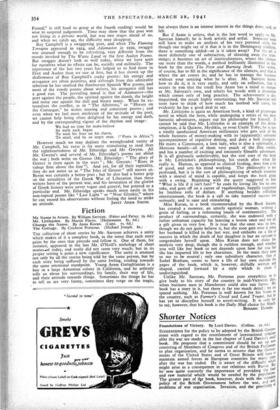Fiction
The Cottage. By Crichton Porteous. (Michael Joseph. 8s.) -
THE collection of short stories by Mr. Saroyan achieves a unity which makes of it a complete book, in the sense that each story gains by the ones that precede and follow it. One of them, for instance, appeared. in the late Mr. O'Neill's anthology of short stories sof today, and really did not seem very much; but in its proper setting it gains a new significance. The unity is attained not only by all the stories being told by the same person, but by each story being suffused by the same feeling, tending towards the same emotional standpoint. Young Aram Gafoghlanian is a boy in a large Armenian colony in California, and he artlessly tells us about his surroundings, his family, their way of life, and their attitude towards things. Sometimes the things he has to tell us are very funny, sometimes they verge on the tragic,
but always there is an intense interest in the things done, said, or felt.
But if Aram is artless, that is the last word to apply to 111x,Saroyan himself; he is both artistic and artful. Someone will have to make an analysis of his very personal style, for though one might say of it that it is in the Hemingway tradition, there is something added—or is it taken away? For the art is most definitely one of subtraction, of shearing away the trim- mings; it becomes an art of inarticulateness, where the silences say more than the words, a method brilliantly illustrated in this book by the story The Poor and Burning Arab. The writer, of course, has to fill in the significance of the silences, and that is where the art comes in; and he has to manage the business without your noticing what he is after. Mr. Saroyan knows how to do it; it is very rarely, and only on reflection, that it occurs to you that the small boy Aram has a mind as mature as Mr. Saroyan's own, and selects his words with a discretion which comes only of long practice. The achievement is dis- tinguished, the result highly entertaining; but Mr. Saroyan will soon have to think of how much his method will carry, for evidently he has a good deal to say.
Mr. Littlejohn is again an American book, a kind of picaresque novel in which the hero, while undergoing a series of the most fantastic adventures, argues out his philosophy for himself. It cannot be said- that Mr. Littlejohn is an example of the divine simpleton, a la Quixote, Myshkin, or even Uncle Toby; he is just a totally uneducated American millionaire who gets sick of the whole business of money-making with its (apparently) universal accompaniment of repulsive dieting, and does a bolt incognito. He meets a Communist, a lorn lady, who is also a spiritualist, a Mexican bandit—all of them very much of the film variety, and has a number. of exciting and eminently filmable adventures. It is all gloriously unbelievable, but the real core of the book is Mr. Littlejohn's philosophising, his search after what life really is. Human, as opposed to clinical feeding, does him a lot of good, and sets his mind %waking. The philosophy is not profound, but it is the sort of philosophising of which everyone with a morsel of mind is capable, and keeps the- book going with a swing. Beginning with the query suggested to him " What is life if it isn't fun? " he ends by loving life for its own sake, and goes off on a career of vagabondage, happily supported by limitless rolls of dollars. If anything besides rollicking entertainment, the book is a call to take material success less seriously, and is sane and stimulating.
Miss Kavan, in a book recommended by the Book Society, has created a monster, an utterly egotistic woman, without a grain of feeling, or a redeeming touch of sentimentality. The product of surroundings, certainly, she was endowed with a rather -unhuman capacity for learning a lesson once and for all, a gift given to very few. It is true that she once was in love, though we do not quite believe it, but she soon gets over it when her husband is killed in the last war, and embarks on a life of success in which the death of her daughter is but an episode to congratulate herself upon. Miss Kavan does not make her analysis very deep, though she is ruthless enough, and whether you will like her book or not depends upon how far you feel she- has imparted life to her characters. In the main they seen to me to be neutral ; only one subsidiary character, that of Isabel Bonham; seems to have a life of her own outside the pages of the book, which is, however, skilfully written and shaped, carried forward by a style which is clean if undistinguished. Unlike Mr. Saroyan, Mr. Porteous puts everything in to give body to his story of the country in- mid-Victorian days, when business men in Manchester could also run farms. His book has a story in it, but there is far too much detail ; we are spared nothing. Mr. Porteous is well known for his books on the country, such as Farmer's Creed and Land Truant, but It has yet to discipline himself to novel-writing. It is only fair to say, however, that his book is the Daily Mail choice for Mardi- BONAMY DoBalE.






























 Previous page
Previous page